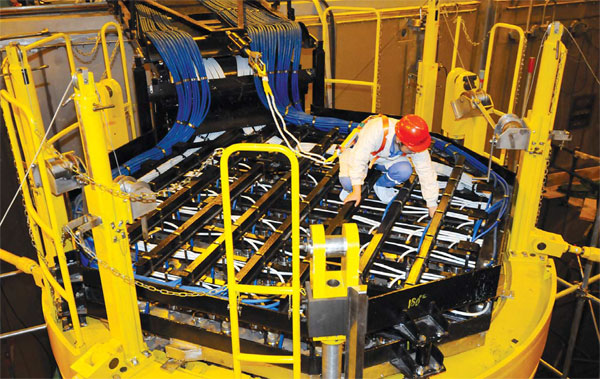 |
|
A worker at Guangxi Fangchenggang Nuclear Power Plant, which uses Hualong One technology. [Photo provided to China Daily] |
The nuclear giant has wrapped up talks for the fourth reactor and signed a framework agreement for a fifth plant. That fifth one is expected to use China's home-grown nuclear technology, according to CNNC sources.
CNNC will work with Nucleoelectrica, the state-owned nuclear operator of Argentina, on the fourth reactor, Atucha 3, which is expected to cost about $6 billion. Construction of the Atucha Nuclear Power Plant Complex in Buenos Aires province is expected to be completed in eight years.
Atucha 3 will be using a Canadian-developed Candu reactor which uses a heavy-water model, while the fifth reactor, Atucha 4, will use China's third-generation pressurized-water nuclear technology, known as Hualong One.
But the site of the project Atucha 4, which is expected to cost $7 billion, has not been decided yet.
According to earlier reports, it is most likely to be on the Paraguay River which flows through the country.
CNNC operates two Candu 6 units at its Qinshan plant in Zhejiang province, which is likely to become the reference projects for Atucha 3.
Through the contract, Nucleoelectrica will provide 62 percent of the equipment, while CNNC will provide the rest of the equipment, goods, and services.
Chinese lenders will support 38 percent of the total funding, according to a report by the Xinhua News Agency.
"The negotiation process for the fourth reactor is complete, and the deal will be closed soon by both countries," the report quoted Argentina's Ministry of Federal Planning, Public Investment and Services as saying.
The deal would be part of a wider plan to boost nuclear power capacity by 3,000 megawatts over the next decade to meet rising demand for electricity in Argentina, where only three nuclear power stations currently operate.
Chinese participation in Argentina's new plants is important for both sides, since Argentina needs funds from China and China is keen on exporting its nuclear technologies, experts said.
"China's nuclear technology can be as competitive as the ones offered by its Western counterparts," said Ma Yi, an expert from China Nuclear Power Engineering Co, adding that the construction of the Hualong One reactor in the Fuqing plant in Fujian province has already started.
China is embarking on an ambitious nuclear power program to change its energy mix toward cleaner fuel, and it hopes to leverage domestic experience to export home-grown technology.
Other Chinese companies involved in the Argentinean nuclear projects may include Harbin Electric, Shanghai Electric, Zhefu Holding Group and China First Heavy Industries Group.
